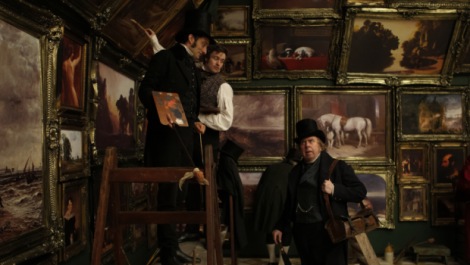Why you can trust GamesRadar+
Fifteen years on from Topsy-Turvy , Mike Leigh returns to the handsome period biopic with a portrait of an artist, 18th-Century giant Joseph Mallord William Turner. A man who evidently didn’t suffer fools gladly – no less, you’d imagine, than Leigh himself. Tempting though it is to interpret Mr. Turner on some level as a self-portrait, this is but one brushstroke in a rich and sprawling canvas. One whose generous running time affords Leigh ample room to explore his subject’s private life, his public persona and the ever-changing Victorian world that restlessly swirled around him.
Kicking off in the 1820s, the film introduces Turner (Timothy Spall) as a man of high ideals and base appetites: a barber’s son with a passion for landscapes who likes nothing more than sharing a pig’s head with his ageing father (Paul Jesson) or having a quickie against the bookcase with his dogsbody housekeeper (Dorothy Atkinson, splendidly Dickensian). Turner relishes his lofty status at the Royal Academy yet takes a schoolboy’s delight in winding up John Constable (James Fleet), his chief rival. He refuses to acknowledge the children he sired with his resentful ex-mistress, yet happily moves in with a guest-house owner (Marion Bailey) the minute her husband (Karl Johnson) is out of the picture.
This is, in short, a complex dude, brought majestically to life by Spall in a performance made up almost wholly of gutteral grunts, contemptuous snorts and dismissive harrumphs. Like his paintings in their early, inchoate forms, Turner’s a bit rough round the edges. Leigh, though, makes it plain that it was precisely from this mass of contradictions that his genius sprang. A huge cast featuring many of Leigh’s regular collaborators populate the fringes with a vivid array of supporting characters that range from disdainful royals to embittered contemporaries to the occasional pliant prostitute.
DoP Dick Pope, meanwhile, brings a painterly elegance to an exhibition’s worth of digital compositions that most memorably include a recreation of The Fighting Temeraire , the “bloody big ship” Daniel Craig took such a liking to in Skyfall . The end result must surely rank as not only one of Leigh’s most significant achievements, but also one that may have a lasting influence on how artists’ lives are chronicled on film in future. If nothing else, the scenes in which Turner uses his own phlegmy sputum to lubricate his watercolours give a whole new meaning to the phrase ‘spitting image’.
One great British artist pays tribute to another in a lengthy but rewarding homage that boasts a titanic turn at its centre. Rarely has watching paint dry been so fascinating.
Neil Smith is a freelance film critic who has written for several publications, including Total Film. His bylines can be found at the BBC, Film 4 Independent, Uncut Magazine, SFX, Heat Magazine, Popcorn, and more.




